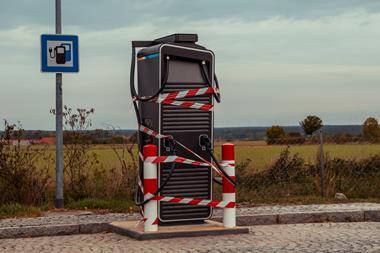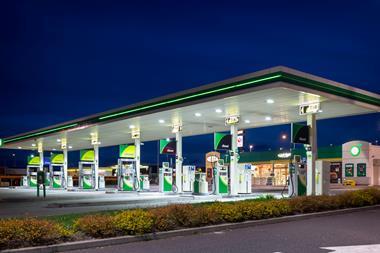After a house, a car is probably most people’s most expensive purchase, which is why they’re so keen to take care of them. But are you providing your customers with what they need?
Autoglym marketing director David Rogers reckons some forecourts have taken their eye off the ball completely when it comes to car care. "A lot of forecourt shops have leapt on board with things like sandwiches and crisps, and deserted car care completely. They’ve let Halfords snatch the whole thing away from them.
"However the difference between Halfords and a forecourt is that the forecourt has the captive audience - they’re serving motorists all day every day so they should be stocking what those motorists want."
Not surprisingly, Rogers advises forecourt retailers to go to their local Halfords to see what’s selling, then stock it.
Autoglym distributes via a network of franchisees and Rogers says they’d be keen to advise individual forecourts on what to stock.
"Basically what forecourts need are four or five really hot sellers," he says. "So that’s polish, shampoo, alloy wheel cleaner, interior cleaner and glass cleaner." And he advises forecourts to stick to well-known brands. "Anybody who wants to look after their car properly will buy well-known brands and they are not averse to paying a fair price for them."
Gulf Retail marketing manager, Adam Walsh, reckons that generally, consumers are not price sensitive about these type of products because they are not bought that often.
"Our objective is to sell into our dealers at the most competitive price possible to provide them with the best possible margins. Good margins mean a greater incentive to promote and sell Gulf lubricants, which increases sales volumes."
Walsh says car care and lubricants are important to both the Gulf brand and its retail business. "They are an extra form of revenue for both the dealer and Gulf Retail. The products also increase awareness of the Gulf brand among the general public."
A typical Gulf shop would have two or three 1m bays - one for lubes, one for car care and maybe a third for specialist items. And this section would account for 3% of a typical shop’s total business.
Display is crucial, says Walsh: "Planograms are critical in helping a forecourt sell more lubricants. Getting the right product in the right place will help to increase sales. Well-created and visible promotional offers can be a strong short-term sales driver. But above all forecourts need knowledgeable personable staff who are prepared to talk to customers. And that’s because it can be difficult for the customer to know which lubricant is right for their car although most people either refer to their glove box manual or have an understanding that most top-up products are compatible. Staff knowledge is very important here, or at least access to advice. We encourage retailers to extend their product knowledge to increase their customer service levels. At a basic level it is important that an operator can at least direct the customer to a source of accurate information even if their own knowledge levels are limited."
Car care and lubricants are important to ExxonMobil too.
Spokesman David Eglinton explains: "Our customers expect to be able to purchase oil for their car, screen wash and coolant as well as other products."
However he adds that the category does not require as much space as food or confectionery. "The most common amount of space given to lubricants is around five x 1m length shelves or about 30 facings."
As for range, Eglinton says that at company-owned sites they have worked hard to make the buying process as simple as possible for the consumer. "Research tells us that most purchases are ’distress’. We recommend sites stock our semi-synthetic 10w/40 which is suitable for many cars and also fully synthetic grades which many more cars now require, because they are run at high temperatures and car manufacturers wish to achieve better fuel economy results. We also recommend sites stock screenwash, coolant and a small range of car care products."
In June Exxon-Mobil launched its Mobil range of lubricants into Esso dealer sites and this month it is launching them into its company-owned chain. "Where we have replaced the Esso branded range of lubricants with Mobil-branded ones, dealers are reporting an uplift in sales. We believe this is due to the brand strength of the Mobil name and also the high profile association with the McLaren Formula 1 Team and in particular Lewis Hamilton."
To help dealers sell Mobil lubricants the company provides forecourts with a Hints and Tips manual to help with staff training; posters and shelf barkers with key product messages for the customer; and a selector wheel for placing beside the lubricants to help customers make the correct choice.
And to get dealers to buy into the Mobil range, the company is currently running a promotion where those who purchase five cases of lubricants get a free Mobil 1 fleece. It is expected to run until the end of November.
== Waxing times ==
Andrew Freeman, European marketing director for Turtle Wax, says that generally the car care market has been buoyant but it has suffered from the poor weather, particularly at weekends when a lot of people would typically be washing or cleaning their cars. "However from a forecourt’s perspective they are less likely to be affected because they are mostly used for distress purchases," he adds.
The latest product from Turtle Wax is the Ice Wax liquid polish. Freeman says the great thing about it is that it leaves no white residue and as a result you can polish your car in about the same time as it takes to wash it. It’s not cheap - the 500ml size retails at £14.99 - but Freeman says it’s a premium product and you don’t need to use much of it. It’s recently been advertised on TV.
Despite Halfords stranglehold on the car care market and the fact that even the grocery multiples stock some lines, Freeman reckons there’s a place for it in forecourts. "Those forecourts with less competition - for instance without a Halfords nearby - really should talk to a local sales rep so they can understand what would sell in their area. After all, motorists still do expect to see a range of maintenance and repair products in their local forecourt."
----
=== Top tips ===
* Keep the range simple.
* Merchandise all lubricants together for greater impact.
* Use a minimum 1m display space.
* Place the lubricants and car care products where the customer can easily see them.
* Ensure staff know the difference between the oils so they can help customers.
* Use point-of-sale to help the customer make the correct choice.
* Use signs/posters outside on the forecourt area to remind the customer that the products are in stock.
Source: Exxon-Mobil
----
=== Case study ===
Susie Hawkins, Simon Smith Group
"Car care is still an important part of the forecourt shop but it is less of a sales generator than it was. For us, car care does better in our smaller stores - in fact our best performing car care section is within our smallest shop. If you look at the supermarkets they stock de-icer and cleaning products so there obviously is a need for it.
"We find that you can fit an awful lot in 1m and our range has a seasonal bias, especially in the winter when the de-icer and scrapers come out.
"We don’t sell nearly as much oil as we did years ago. Technology has moved on and cars are generally more reliable. We also don’t sell the fuses and bulbs that we used to - perhaps that’s because people don’t change them themselves any more?"



























No comments yet